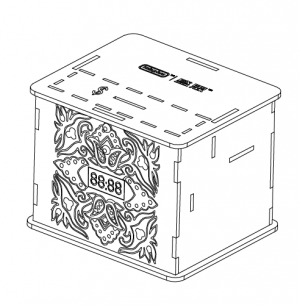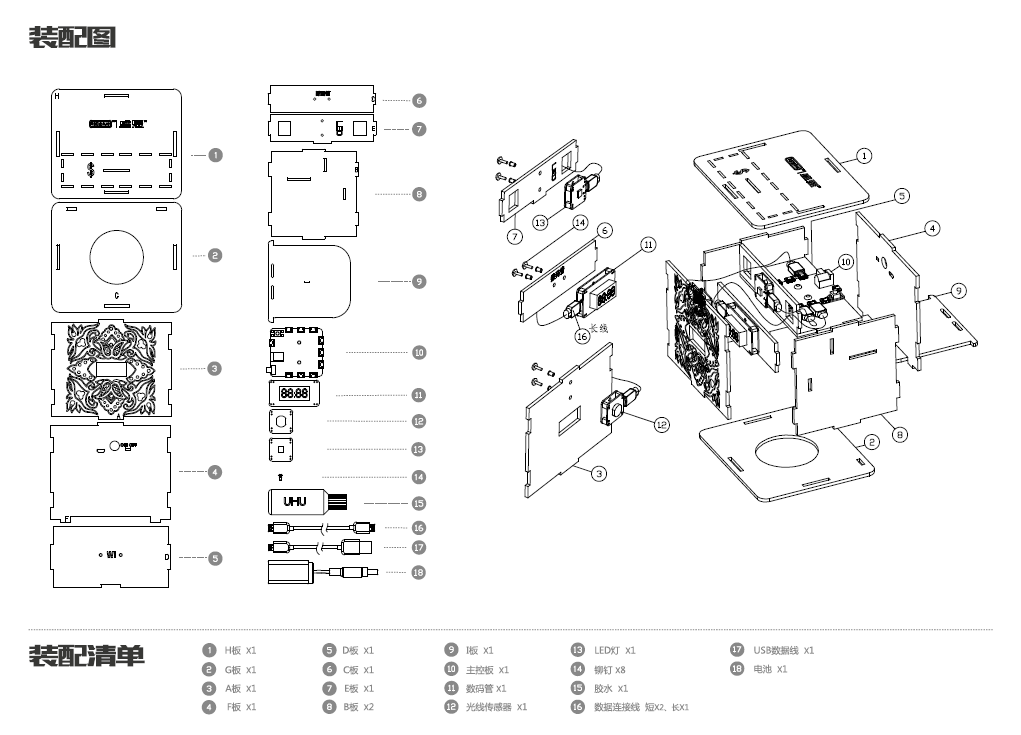硬币存款机
来自Labplus盛思维基百科
Tangliufeng(讨论 | 贡献)2018年5月29日 (二) 15:08的版本
概述
本作品可实现自动记录硬币存贮数量功能,支持断电记忆。使用时先根据制作说明将作品组装完整,然后 接上电源(9V电池或USB供电),打开主控板开关,放入硬币即可自动计数。硬币经过入口时,遮挡入口下 方光线传感器,用光线传感器遮挡次数记录放入硬币的数量;需要重置存款机时,遮挡光线传感器5秒, 数码管自动归零。DIY动手组装,锻炼动手能力,了解智能创意电子套件的使用,激发创新思维,增加学 习乐趣。
使用教程
程序控制流程:
1.通过光线传感器检测是否有硬币落下,当检测到硬币落下,计数器加1,并加数值写到EEPROM中,实现断电储存计数器。
2.当检测到光线传感器为暗时超过5秒,即将EEPROM中的计数器值清零。
组装说明
电子模块清单
| 模块名称 | 数量 |
|---|---|
| W1主控板 | x1 |
| 光线传感器 | x1 |
| LED灯 | x1 |
| 数码管 | x1 |
电子模块连接说明
| 模块 | 引脚 | 说明 |
|---|---|---|
| 光线传感器 | W1-A0/A1接口 | |
| LED灯 | W1-3/11接口 | |
| 数码管 | W1-I2C接口 |
Arduino程序/图形化程序
| 硬币存款机Arduino程序包 |
#include "Wire.h"
#include "TM1650.h"
#include "EEPROM.h"
#define Light_int A0
#define Led_out 3
typedef union
{
uint8_t byteData[2];
uint16_t intData;
}BYTE_INT;
BYTE_INT counct;
unsigned int Light_sr = 0;
int val,vall;
int16_t temp = 0;
TM1650 d;
char line[] = {"----"};
unsigned long blanktime;
unsigned char TEMP;
void Display_LED();
void hexToBCD(int16_t val);
char getTochar(uint8_t bcd);
unsigned int getTime(unsigned long ntime);
unsigned int number=0; /* 代表那个非常大的数字 */
unsigned char ge,shi,bai,qian,wan;
int16_t DispData[5]; //数据缓冲数组
int ks=0;
unsigned long flag=0;
void setup()
{
// put your setup code here, to run once:
Wire.begin(); // join i2c bus (address optional for master)
d.init();
d.displayOff();
counct.byteData[0] = EEPROM.read(1);
counct.byteData[1] = EEPROM.read(2);
pinMode(Light_int,INPUT);
pinMode(Led_out,OUTPUT);
analogWrite(Led_out, 60);
number = counct.intData;
hexToBCD(counct.intData);
d.displayString(line);
d.setBrightness(2);
d.displayOn();
Serial.begin(115200);
}
void loop()
{
Display_LED();//光存钱罐
}
/**********************************************************************************
*
**********************************************************************************/
void hexToBCD(int16_t val)
{
int i;
int16_t num = val;
if (num > 999) num = 999;
for (i=0; num > 99; i++) num -= 100;
if(i != 0) line[1] = getTochar(i); else line[1] = ' ';
for (i=0; num > 9; i++) num -= 10;
line[2] = getTochar(i);
line[3] = getTochar(num);
line[0] = ' ';
}
/**********************************************************************************
*
**********************************************************************************/
char getTochar(uint8_t bcd)
{
char c;
switch (bcd)
{
case 0:
c = '0';
break;
case 1:
c = '1';
break;
case 2:
c = '2';
break;
case 3:
c = '3';
break;
case 4:
c = '4';
break;
case 5:
c = '5';
break;
case 6:
c = '6';
break;
case 7:
c = '7';
break;
case 8:
c = '8';
break;
default:
c = '9';
break;
}
return c;
}
/********************************************************************************************************
*时间获取函数
********************************************************************************************************/
unsigned int getTime(unsigned long ntime)
{
if(millis() < ntime)
{
return ((unsigned int)((millis() + (~ntime) + 1)));
}
else
{
return ((unsigned int)((millis() - ntime)));
}
}
void Display_LED()
{
Light_sr = analogRead(Light_int);//读取光线值
// Serial.println("1: ");//测试用
// Serial.println(Light_sr);//测试用
if(Light_sr<5)
{
delay(1);
if(analogRead(Light_int)<5)
{
blanktime = millis();
while(Light_sr<30)
{
Light_sr = analogRead(Light_int);
if((millis()-blanktime)>=5000)
{
number = 0;
counct.intData = number;
EEPROM.write(1,counct.byteData[0]);
EEPROM.write(2,counct.byteData[1]);
hexToBCD(number);
d.displayString(line);
d.displayOn();
delay(2000);
ks = 0;
break;
}
else
{
ks=1;
}
// Serial.println("2: "); //测试用
// Serial.println(Light_sr); //测试用
}
}
}
if(ks) //环境变暗,即投下硬币
{
ks = 0;
number++;
Serial.print("number:");
Serial.println(number);
counct.intData = number;
EEPROM.write(1,counct.byteData[0]);
EEPROM.write(2,counct.byteData[1]);
hexToBCD(number);
d.displayString(line);
d.displayOn();
}
}
FAQ
版本历史记录
| Version | Date | 新增/删除/修复 |
|---|---|---|
| V1.2 |

